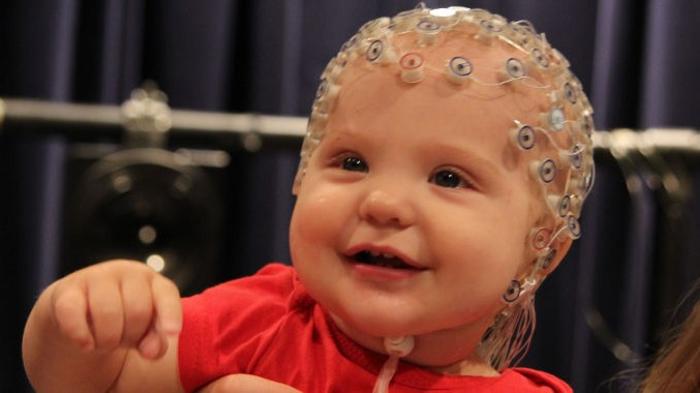In a small, exploratory study, levels of certain types of microbes in babies’ guts were shown to be associated with performance in tests of early cognitive development. Sebastian Hunter of the University of British Columbia, Canada, and colleagues present these findings in the open-access journal PLOS ONE on August 9, 2023.

Credit: Auditory Development Lab, McMaster University, CC-BY 4.0 (https://creativecommons.org/licenses/by/4.0/)
In a small, exploratory study, levels of certain types of microbes in babies’ guts were shown to be associated with performance in tests of early cognitive development. Sebastian Hunter of the University of British Columbia, Canada, and colleagues present these findings in the open-access journal PLOS ONE on August 9, 2023.
Mounting evidence has highlighted numerous ways in which the community of diverse microbes that naturally reside in the human gut—the microbiome—is connected to human health, including brain health. Several studies in animals and humans have hinted at connections between the microbiome and early-life brain development, but few have examined how differences in infants’ microbiomes might be associated with differences in their emerging cognitive abilities.
To help deepen understanding of these potential connections, Hunter and colleagues analyzed data from 56 infants aged four to six months. The infants had each completed at least one of three evaluations of various cognitive abilities, and the researchers evaluated their gut microbiomes using fecal samples.
They found that infants who succeeded at a test of social attention known as “point and gaze”—which measures the ability to share focus on an object with another person—tended to have higher amounts of microbes in the Actinobacteria phylum, the genus Bifidobacterium, and the genus Eggerthella, and lower amounts of microbes in the Firmicutes phylum, the Hungatella genus, and the Strepcococcus genus.
Meanwhile, electroencephalogram measurements of infants’ brain activity in response to hearing a steady beat showed that certain patterns of activity linked to better rhythmic processing were associated with higher or lower levels of certain microbe types, as well as with levels of certain metabolic chemical reactions involving microbes that prior studies have linked to brain and spinal cord development.
No links were found between the microbiome and measurements of blood flow in the infants’ brains in response to hearing recordings of both forward and backward human speech.
Overall, these findings are in line with the idea that the microbiome might influence early cognitive development, but more research is needed to confirm and clarify this role.
The authors add: “In our small pilot study, we observed interesting associations between the microbiome and brain function in early infancy. Further replication and research could be fruitful for understanding the role of the microbiome in early cognitive development.”
#####
In your coverage please use this URL to provide access to the freely available article in PLOS ONE: https://journals.plos.org/plosone/article?id=10.1371/journal.pone.0288689
Citation: Hunter S, Flaten E, Petersen C, Gervain J, Werker JF, Trainor LJ, et al. (2023) Babies, bugs and brains: How the early microbiome associates with infant brain and behavior development. PLoS ONE 18(8): e0288689. https://doi.org/10.1371/journal.pone.0288689
Author Countries: Canada, France
Funding: This research was funded by grants to JFW, LJT and BBF from the Canadian Institute for Advanced Research (CIFAR, https://cifar.ca/) (FL-000981-CF, FL-000982-CF, & FL-000983-CF). Work in B.B.F.’s lab is also supported by a Canadian Institute for Health Research (CIHR) Foundation Grant, in J.F.W.’s lab by a Natural Sciences and Engineering Research Council of Canada (NSERC) Discovery Grant and a Social Sciences and Humanities Research Council of Canada (SSHRC) Insight Grant, and in L.J.T.’s lab by grants from CIHR, NSERC and SSHRC. The funders had no role in study design, data collection and analysis, decision to publish, or preparation of the manuscript.
Journal
PLoS ONE
DOI
10.1371/journal.pone.0288689
Method of Research
Observational study
Subject of Research
People
Article Title
Babies, bugs and brains: How the early microbiome associates with infant brain and behavior development
Article Publication Date
9-Aug-2023
COI Statement
The authors have declared that no competing interests exist.




